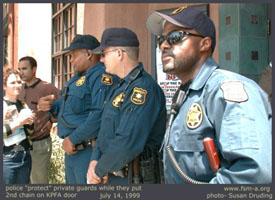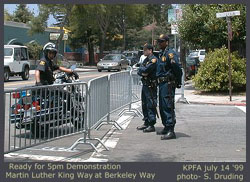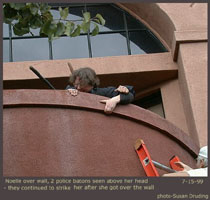
by Kellia Ramares
Berkeley Police Chief Dash Butler issued a stinging rebuke to the Pacifica
Foundation in response to Executive Director Lynn Chadwick's assertion
that the Berkeley Police did not provide adequate protection for persons
and property during this summer's protests at KPFA. In a letter to the
editor of the Berkeley Daily Planet, his first such letter in 10 years
as police chief, Butler took exception to Chadwick's accusation that the
Berkeley police were responsible for the high costs associated the Pacifica's
dispute with KPFA's staff and supporters.
"As Police Chief, I resent the ultimate spin doctoring of the facts," Butler wrote. "Instead, the Pacifica Foundation owes the men and women of the Berkeley Police Department heartfelt thanks for giving up days off, vacations, and other commitments in order to assist in providing for peaceful dissent following Pacifica Foundation management decisions."
On September 3rd, Chadwick wrote a letter to California Assemblyman Scott Wildman (D-Glendale), Chair of the Joint Legislative Audit Committee, which is currently investigating Pacifica. In attempting to justify to the committee Pacifica's extraordinary expenditures for armed guards at KPFA, Chadwick wrote, "Pacifica was advised by the Berkeley Police Department that it was unable to provide the level of security necessary to protect persons and property. As a result, Pacifica was required to retain its own security and made other arrangements to allow it to continue to safely operate the stations [sic] and at the same time minimize the risks to persons and property. "
Chadwick also wrote to Berkeley Mayor Shirley Dean, stating that she would be forwarding the bills for security to the mayor's office and requesting that the mayor "agree to pay for these costs we incurred due to the inability or unwillingness of the Berkeley Police Department to provide adequate protection. "
Butler's letter dismissed Chadwick's claim. "[i]f anything, the Pacifica Foundation, should be offering to reimburse the City of Berkeley for overconsumption of City services and apologizing for draining the City budget." Berkeley is a city of 125,000 people. Police overtime connected with the KPFA crisis ran to approximately $200,000.
Chadwick asserted to Wildman that Pacifica’s expenses “were clearly necessary and appropriate. It is ironic that those who caused Pacifica to have to spend these monies are the very ones who condemn the expenditures.”
According to Butler, "many labor disputes have taken place in the City
of Berkeley during the last 25 years, and many companies have hired private
security to assist in maintaining the peace and providing additional security
for their property. Each and every time, the Berkeley Police Department
has maintained a neutral position. However, the Pacifica Foundation's decision
to turn a labor dispute into a mass arrest situation was a first.

"This occurred in spite of our advice to their management. How
ironic that after ignoring the advice and deciding to make so many arrests,
they have NOW decided that they do not wish to follow through with the
prosecution of those arrested.
"...Lynn Chadwick and the rest of Pacifica Foundation should pull out an appropriate sized mirror and take a good look at the real culprits--those who made their decisions during the dispute."
On June 23rd, 14 people staged a peaceful sit-in in front of the Pacifica National office, next door to the KPFA studios. The purpose of the protest was to block Lynn Chadwick’s entrance into the office in order to get her to speak with them. Chadwick summoned the police who, at first, refused to make any arrests because the protesters were on private property and were not committing any crimes. Chadwick was then compelled to make a citizen’s arrest on each of the protesters before the police would act. The arrests were made peacefully.
Several days later, Chief Butler received a phone call from Joe Brann, a former California law enforcement colleague and currently the No. 3 person in the US Department of Justice. The purpose of the “friendly” call was to inquire about the police handling of the sit-in. Brann is in charge of the federal program that provides money to localities to put more police on the streets. Both Butler and the Justice Department confirmed that the call had been instigated by Pacifica National Board Chair Dr. Mary Frances Berry, who is also Chair of the US Commission on Civil Rights, who contacted the Justice Department.
On the night of July 13th, police arrested 52 people at the insistence of Chadwick’s newly appointed special assistant, Garland Ganter of Houston, when a protest arose after Ganter placed investigative reporter Dennis Bernstein on “indefinite administrative leave,” allegedly for violating Pacifica’s gag rule against reporting stories about Pacifica’s dispute with KPFA. Bernstein, this writer and several other reporters were peacefully arrested in the KPFA newsroom. But the police were on the scene in riot gear. Thus began the 23-day lockout of KPFA.
The police stepped up their helmeted presence during rallies in front of the station on July 14th and 15th, arresting and using billy-clubs against several protesters who attempted to hang a banner from the station’s second floor balcony on the 15th (the so-called “ladder incident”). Several arrests were also made in the ensuing days when police, in the middle of the night, rousted protesters who set up Camp KPFA, a small tent city in the street in front of the station. With overtime costs growing, the Berkeley City Council, with the backing of Mayor Shirley Dean, unanimously passed a resolution on July 27th, supporting the staff of KPFA and ordering a police pullback.
On August 13th, Lynn Chadwick sent a letter, followed up by a fax, to
the Alameda County District Attorney’s office, stating that the Pacifica
Foundation wished to drop all charges in order to heal the community. However,
apparently not everyone in the D.A.’s office was aware or certain of Pacifica’s
intentions and the arraignment of those arrested on July 13th and 15th
proceeded on August 20th. The following week, Chadwick took the stand in
the trial of the protesters on which she had placed citizens arrest on
June 23rd. Under oath, Chadwick stated that she had sent a letter requesting
that charges be dropped and that she was still of that opinion. The prosecutor
then dropped the charges. Thereafter, as cases came up for pre-trial
conference, the assistant district attorneys working them dropped the charges.
On September 9th , assistant district attorney Jim Panetta “regretfully”
dismissed the cases against all those arrested on the night of the lock-out
and in the “ladder incident” two days later.
As of September 16th, charges are still pending against only two individuals. The first is Kahlil Jacobs-Fantauzzi, who was charged with resisting an officer while at Camp KPFA. Jacobs-Fantauzzi asserts that he was roughly treated by police when he stepped in to mediate a brewing argument between a police officer and a camper. A hearing has been set for October 5th on a Pitchess motion, in which Jacobs-Fantauzzi’s attorney, Melanie Carver, will seek to discover any records indicating that the particular officers involved in Jacobs-Fantauzzi’s arrest have a history of using excessive force. Such a history would be a defense to a “resisting” charge. A jury trial for Jacobs-Fantauzzi is set for October 28th, though it is still possible, according to Carver, that the charge will be dropped before then.
The second case outstanding case involves Jordy Simpson, accused of
jaywalking. He was part of a group of people arrested for jaywalking, the
rest of whom pleaded no contest to this infraction. Simpson refused to
make such a plea. Several other people accused of jaywalking, who were
not part of Simpson’s arrest group, have had their charges dropped. Simpson,
who for some unknown reason, was not on the same court calendar as the
other alleged jaywalkers, may see his charge dropped also, according to
Carver. Procedurally, charges may be dropped at any time. However, the
prosecutor’s office has been dropping charges only on the days defendants
are scheduled to appear in court.
On September 14th, the Berkeley City Council unanimously adopted Mayor
Dean's recommendation that the City reject Chadwick's demand for reimbursement.
Additionally, the Council asked the City Manager to write a letter asking
that Pacifica reimburse the city for the extensive police overtime costs.
The council also requested the city attorney and city manager to investigate
the appropriateness of joining a pending lawsuit by a number of advisory
board members of the Pacifica stations that seeks to overturn the governance
changes made in February of this year that turned the Pacifica National
Board into an entirely self-selecting body.
? 1999 Kellia Ramares
All rights reserved.
|